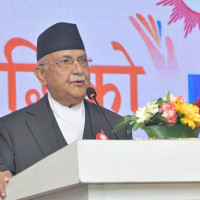The ruling parties also have the tendency to roll out some ‘populist’ programmes bearing catchy slogans with a view to projecting themselves differently from the previous administration. If the practical considerations are overlooked, the populist announcements turn out to be a nine-day’ wonder. Such programmes are ambitious and partisan in nature, lacking a far-sighted approach and timely allocation of funds. This sort of practice is disadvantageous to rapid development and should be owned by a broad section of the populace.
House deadlock
On Tuesday, the coalition government, led by Prime Minister Pushpa Kamal Dahal Prachanda, unveiled its policy and programmes for the fiscal year 2081/82 B.S. amidst the protracted deadlock in the federal parliament. The main opposition Nepali Congress (NC) has been disrupting the House proceedings, demanding the formation of a parliamentary panel to investigate the alleged involvement of Home Minister Rabi Lamichhane in the misuse of cooperative funds. However, the NC has refrained from obstructing President Ram Chandra Paudel from presenting the government’s policy and programmes at the joint meeting of parliament, as such an act could invite a constitutional problem and give the wrong message about the motive of the old grand party.

The policy and programmes have served as the theoretical framework for the upcoming fiscal year budget. The policy document has set nine key priorities – implementation of the constitution, institutionalisation of federalism, economic reform and revival, increase in production and productivity, employment generation, promotion of good governance, streamlining of public service delivery, establishment of a people-friendly governance system, and corruption control.
The government has announced several campaigns to boost agriculture, hydropower, industries, information technology, and social security, among others. The 'Partnership for Production and Employment’ scheme to be implemented through collaboration among the government, private sector, cooperatives, and communities will give a fillip to domestic industries and help reduce the soaring trade deficit. 'Investment Decade in Agriculture’ starting with this, the country expects to attain self-reliance on the production of fruits in five years and livestock and fish in two years. The upcoming fiscal year is another promising drive aimed at modernising and commercialising agriculture. Through this, the country expects to attain self-reliance on the production of fruits in five years and livestock and fish in two years. The installed capacity of electricity will be increased to 4,500 MW in the new fiscal year. This goal is not unachievable, given the abundant water resources.
Similarly, another initiative, 'Information Technology Decade, envisions developing Nepal as a global IT hub and producing 5,000 jobs. Under the national campaign for innovation and start-ups, around 1,000 youths will receive concessional loans to run startups. The Citizens Service Centre will be established in coordination with the local level to provide service to the different agencies from a single point while the settlement problems of 500,000 landless squatters will be sorted out.
The government is determined to conclude the remaining tasks related to peace processes and transitional justice, introduce the Federal Civil Service Act to institutionalise the federal system, and bolster anti-graft agencies such as the Commission for the Investigation of Abuse of Authority (CIAA) to curb corruption. Thousands of people have lost their money deposited in various cooperatives. The depositors have hit the streets while the parliament has been virtually dysfunctional over this issue for many weeks. Taking the gravity of the problem into account, the government has decided to set up a dedicated regulatory body, specialised funds, and recovery mechanisms to solve the problem.
Capacity building
In order to avoid the duplication of some programmes, it is necessary to enhance the state’s capacity, efficiency, and management to implement them. For instance, the government has announced to re-open the closed industries in the upcoming fiscal years by attracting the private sector’s investment, which was also included in the current FY. It seeks to resume the Gorakhkali Rubber Industry, Butwal Yarn Factory, and Hetauda Textile Industry based on a public-private partnership or any other viable means. These industries were shut down owing to various factors, such as mismanagement and political interference. No doubt, this is the right step towards correcting the past erroneous policy when state-owned enterprises were heavily politicised or recklessly privatised without considering their implications.
The government’s step to bar the teachers, professors, and employees involved in the teaching profession from becoming members of political parties sounds bold. The objectives stated in the policy paper are not unattainable, but they require strong political will, stability, policy consistency, transparency, and administrative accountability. Now the time has come for the leadership to walk the talk to achieve democratic order, inclusive development, and the vision of a welfare state.
(The author is Deputy Executive Editor of this daily.)


















